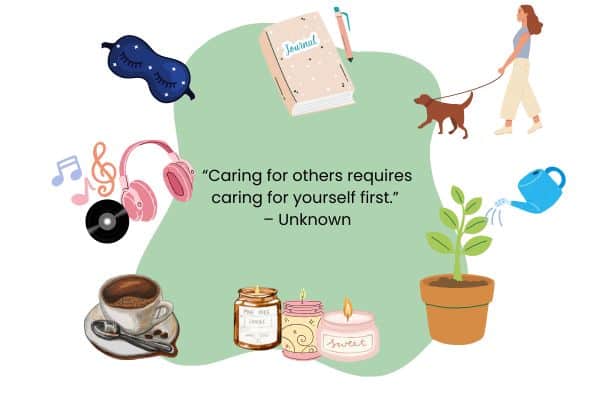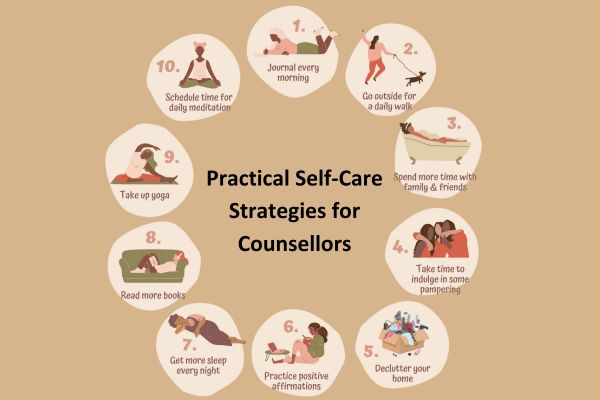“You can’t pour from an empty cup. Take care of yourself first.” — Norm Kelly
As a counsellor, I also realise how easy it is for you to put all your energy into helping everyone else while forgetting about yourself. I know because I’ve been there — working late for our clients, taking calls deep into the evening, carrying over emotional weight from their struggles even after sessions are over. For years, I thought this was part of the job. I thought that the more I gave, the better counsellor I would be.
But I was wrong.
Giving endlessly without replenishing myself didn’t make me a better counsellor—it made me an exhausted one. I started to notice the signs of burnout creeping in: emotional fatigue, irritability, and a nagging sense that I was losing the empathy that had once driven my work. It was a wake-up call, and it forced me to confront a truth I’d been avoiding: I couldn’t care for others if I didn’t first care for myself.
This realisation transformed my approach to counselling—and my life. In this blog, I want to share why self-care is not just important but essential for counsellors. I’ll also offer practical strategies that have helped me maintain my well-being while continuing to support my clients effectively.
“Almost everything will work again if you unplug it for a few minutes, including you.” — Anne Lamott
The Emotional Weight of Counselling Work
Counselling is a profession rooted in empathy and connection. Every session, I step into the emotional world of my clients, holding space for their pain, trauma, and challenges. It’s incredibly rewarding, but let’s be honest: it’s also emotionally taxing.
There have been days when I’ve left my office feeling utterly drained, not just physically but mentally and emotionally. Sometimes, the stories I hear linger with me, replaying in my mind as I try to unwind at home. I’ve learned that this is a natural part of the work we do—but without proper self-care, it can become overwhelming.
Counsellors are particularly susceptible to compassion fatigue, a condition where prolonged exposure to others’ suffering starts to diminish our ability to empathise. Add to that the risk of burnout, which stems from chronic stress and emotional exhaustion, and it’s clear why self-care isn’t a luxury for us—it’s a necessity.
Why Self-Care Matters
When I first started exploring self-care, it felt counterintuitive. How could taking time for myself make me a better counsellor? Wasn’t my job to put others first?
“When we give ourselves compassion, we open our hearts in a way that can transform our lives.” — Kristin Neff
But over time, I’ve come to understand that self-care is not selfish; it’s a professional responsibility. Here’s why:
- Self-Care Prevents Burnout – Burnout doesn’t happen overnight—it creeps in gradually, fuelled by long hours, emotional strain, and neglecting our own needs. By prioritising self-care, I’ve been able to break this cycle and create a sustainable rhythm in my work.
- It Maintains Empathy – Empathy is the cornerstone of counselling, but it requires emotional bandwidth. When I’m well-rested and cared for, I can show up fully for my clients, offering the compassion and understanding they deserve.
- It Enhances Professional Effectiveness – I’ve noticed that when I take care of myself, I’m sharper, more creative, and better able to connect with my clients. Self-care isn’t just about surviving this work—it’s about thriving in it.
How I Learned to Prioritise Self-Care
Making self-care a priority wasn’t easy for me. It meant unlearning years of habits and beliefs that equated overwork with success. It also meant setting boundaries—something I’d always struggled with.
Here’s what helped me make self-care a consistent part of my life:
- Setting Boundaries – I used to think that being available to my clients 24/7 was a sign of dedication. But I’ve learned that boundaries are not barriers—they’re bridges to healthier relationships. Setting clear work hours, turning off my phone after sessions, and scheduling breaks has made a world of difference.
- Creating a Self-Care Routine – Self-care looks different for everyone, but for me, it’s about finding small, daily practices that recharge me. Whether it’s a morning walk, a quiet moment of mindfulness, or an evening spent journaling, these routines help me reset and refocus.
- Seeking Support – As counsellors, we’re used to being the support system for others—but we need support, too. Regular supervision, peer connections, and even seeking therapy for myself have been invaluable in navigating the challenges of this work.
Practical Self-Care Strategies for Counsellors
“You owe yourself the love that you so freely give to others.” — Unknown
If you’re wondering where to start with self-care, let me share a few strategies that have worked for me:
- Physical Self-Care
- Exercise regularly, even if it’s just a short walk. Movement helps release anxiety, stress and boosts energy.
- Prioritise sleep—it’s the foundation of physical and mental well-being.
- Nourish your body with balanced meals that keep you energised throughout the day.
- Emotional and Mental Self-Care
- Practice mindfulness to stay present and grounded.
- Journal your thoughts and emotions as a way of processing your experiences.
- Don’t hesitate to seek therapy for yourself—it’s a powerful way to explore your own feelings and challenges.
- Professional Self-Care
- Attend supervision regularly to gain insights and offload professional challenges.
- Build a network of peers who understand the unique demands of counselling.
- Continue learning through workshops, books, and training to stay inspired and confident in your skills.
The Ripple Effect: How Self-Care Benefits Clients
One of the most surprising lessons I’ve learned is how much my self-care impacts my clients. When I’m at my best, I can give them my best. Here’s how:
- Improved Outcomes
- Clients notice when their counsellor is fully present and engaged. Self-care ensures I can offer that presence consistently.
- Modelling Healthy Behaviour
- By prioritising my own well-being, I show my clients that self-care is important and achievable, even in the midst of challenges.
- Building Trust
- When clients see that I respect my own boundaries, it reinforces the importance of them setting boundaries in their own lives.
A Personal Story of Transformation

That moment was a turning point. I decided to make a change. I started small—adding a short walk to my daily routine and setting a firm end time for my workday. Gradually, I added more practices, like regular journaling and attending supervision sessions.
The transformation was profound. Not only did I feel more energised and balanced, but I also noticed a shift in my work. I was more attuned to my clients, more creative in my approaches, and more confident in my ability to support them.
Conclusion: Embracing Self-Care as a Professional Responsibility
If there’s one message I hope you take from this, it’s that self-care isn’t selfish—it’s a vital part of being a great counsellor. When we care for ourselves, we create the capacity to care for others more effectively.
So, start today. Choose one small act of self-care and commit to it. Whether it’s setting a boundary, taking a break, or seeking support, remember that every step you take towards your own well-being is a step towards being the best counsellor you can be.
You deserve it—and so do your clients.
“Rest and self-care are so important. When you take time to replenish your spirit, it allows you to serve others from the overflow. You cannot serve from an empty vessel.” — Eleanor Brownn
Refrences:
– British Association for Counselling and Psychotherapy (BACP) – Burnout & Self-Care in Counselling
- https://www.bacp.co.uk/
- Provides research and ethical guidelines on self-care in counselling professions.
– Figley, C. R. (1995). Compassion fatigue: Coping with secondary traumatic stress disorder in those who treat the traumatized.
- A foundational text that explains how constant exposure to clients’ trauma can lead to emotional exhaustion for counsellors.
– The National Institute for the Clinical Application of Behavioral Medicine (NICABM)
- https://www.nicabm.com/
- Offers research-based strategies for therapist self-care and burnout prevention.










